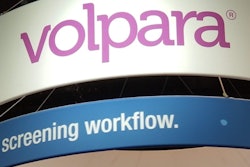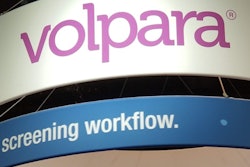
ScreenPoint Medical and Volpara Health are highlighting the results of a study showing the efficacy of combining the companies' respective technologies for predicting long-term risk of invasive breast cancer.
The study, published in the Journal of Clinical Oncology, found that the combined approach using the Transpara Exam Score with Volpara TruDensity improves long-term risk prediction when compared with traditional risk assessment.
The study sought to find out whether an artificial intelligence (AI) algorithm could help with such prediction. It included images of 2,412 women with invasive breast cancer and 4,995 matched controls who had digital mammograms two to 5.5 years prior to cancer diagnosis.
The researchers found that a one-unit increase in AI score was tied to 20% greater odds of invasive breast cancer, with an odds ratio (OR) of 1.20 and an area under the curve (AUC) of 0.63. They also found similar trends for advanced and interval cancers, as well as for dense breasts.
Additionally, the team found that AI score improved prediction of all cancer types in models with density measures and that discrimination improved for advanced cancer. However, this did not reach statistical significance for interval cancer.



















